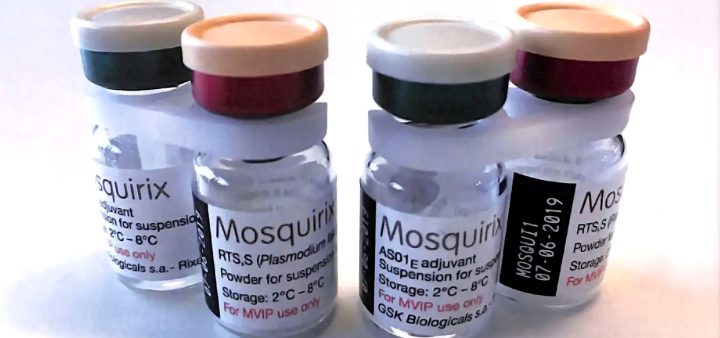GLOBAL THREAT OP-ED
Vaccine hesitancy in Africa needs to be addressed urgently before rolling out the malaria jab

It is critical that public healthcare authorities in malaria-endemic countries begin addressing the three Cs linked to vaccine hesitancy – confidence, complacency and convenience – before deploying the malaria vaccine.
October 6 2021 will go down as a landmark day in the annals of malaria history. After more than 30 years of research and numerous expert committee reviews, the World Health Organization (WHO) announced with great fanfare that it was recommending the widespread use of the first malaria vaccine, Mosquirix. WHO director-general Tedros Ghebreyesus said: “This is a historic moment. The long-awaited malaria vaccine for children is a breakthrough for science, child health and malaria control.” These are sentiments echoed by many malaria experts.
While it is indeed a historic moment, the WHO endorsement is the first step on a long, arduous path, riddled with many challenges, to impactful implementation: a significant reduction in childhood mortality due to malaria. The recent commitment by GAVI, the global vaccine alliance, to support GAVI-eligible countries in procuring and delivering the vaccine, is encouraging. However, experience from the roll-out of the Covid-19 vaccine clearly shows that access does not automatically translate to uptake, irrespective of the health benefits the vaccine offers. In South Africa, the country most affected by Covid-19 on the continent, the vaccination rate is well below the required 70% mark, with only about 43% of the population vaccinated to date.
Public perception and understanding of vaccinations are critical in an environment where the reluctance (vaccine-hesitant) or refusal (vaccine refusers) to be vaccinated is becoming a widespread phenomenon. Vaccine hesitancy was previously viewed as a problem that was largely limited to the more affluent countries, but it is becoming more prevalent in developing countries.
Vaccinations are considered one of the most cost-effective means of preventing diseases, so the growing anti-vaccination sentiment poses a significant threat to global disease control and prevention efforts. The WHO is clearly very concerned about anti-vaccination sentiment, including vaccine hesitancy, in its 2019 list of 10 major threats to global public health – a list that includes global influenza pandemics, antimicrobial resistance, HIV and Ebola!
Misinformation
The reasons for vaccine hesitancy are complex, multifactorial and context-specific, and are largely influenced by three factors: confidence, complacency and convenience. Understanding and addressing vaccine hesitancy is further complicated by the fact that vaccine sentiments swiftly change on what often seems like a whim.
All forms of media, but increasingly the newer, poorly regulated social medial platforms, play a significant role in informing and/or swaying vaccine sentiment. Easy access to unregulated digital platforms has enabled individuals and groups opposed to vaccination to rapidly disseminate misinformation on a global scale. This has been clearly demonstrated with the Covid-19 vaccine, where unsubstantiated claims by individuals, including respected scientists and Nobel Prize winners, have rapidly gained traction among the general population. Within a month of the first claims that the Covid-19 vaccine causes infertility in women being made in Germany, women in the UK and America were enquiring about the impact of the vaccine on their fertility. This was despite a lack of evidence to support this allegation and the European Union approving the Pfizer vaccine for use in the same month.
To reduce childhood mortality due to malaria, optimal vaccine coverage must be achieved over a sustained period. It is therefore critical that public healthcare authorities in malaria-endemic countries begin addressing the three Cs linked to vaccine hesitancy – confidence, complacency and convenience – before deploying the malaria vaccine. Strong leadership and early engagement with affected communities and the relevant healthcare providers are the first steps towards building confidence in the vaccine. The substantial development time of the vaccine should, hopefully, avoid one of the factors affecting confidence in the Covid-19 vaccine: the unprecedented speed of development.
This would be further supported by transparency in policy-making, and effectively addressing concerns raised by affected communities and healthcare professionals. Messaging that addresses these concerns and highlights the benefits of the vaccine must be developed with the support of communication experts and shared as widely as possible. Critically, it must be regularly and proactively updated to address new concerns while reinforcing the benefits of vaccinations. Identifying local celebrities as malaria vaccination champions will also help to build confidence in the vaccine and encourage its uptake, particularly if children of these champions are seen taking it.
The obstacles
While building confidence and addressing complacency around the malaria vaccine appear relatively straightforward, there are major challenges associated with the convenience aspect. Although the uptake of the full four doses over 18 months was relatively high during the malaria vaccine implementation programme, it is very unlikely that this level of coverage will be achieved under the normal standard of care, unless innovative steps are taken to expand access to the vaccine. The intermittent preventive treatment in pregnancy programme has shown clearly that despite being extremely beneficial to both the mother and foetus, the challenges of convenience – the need for three doses over nine months – have limited the uptake. Innovations are required to prevent this from happening to the malaria vaccine. One possible solution is using community healthcare workers as vaccinators to expand access to the vaccine.
While the approval of the malaria vaccine is an impressive first step, a lot of work still needs to be done to ensure an effective, impactful roll-out. Governments must build confidence in the vaccine while ensuring complacency does not set in and that affected communities can easily access vaccines. With these in place, the malaria vaccine could potentially save millions of African children. DM/MC
Shüné Oliver is a medical scientist at the National Institute for Communicable Diseases. Jaishree Raman works at the Laboratory for Antimalarial Resistance Monitoring and Malaria Operational Research, National Institute for Communicable Diseases.
[hearken id=”daily-maverick/9366″]

















 Become an Insider
Become an Insider
Comments - Please login in order to comment.